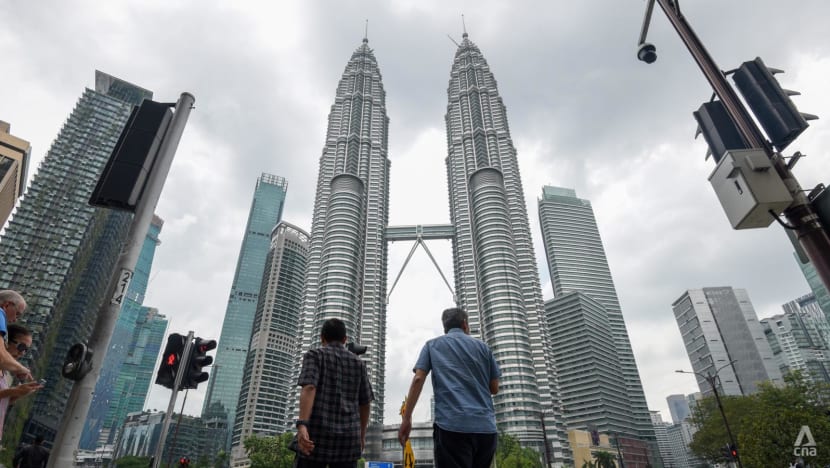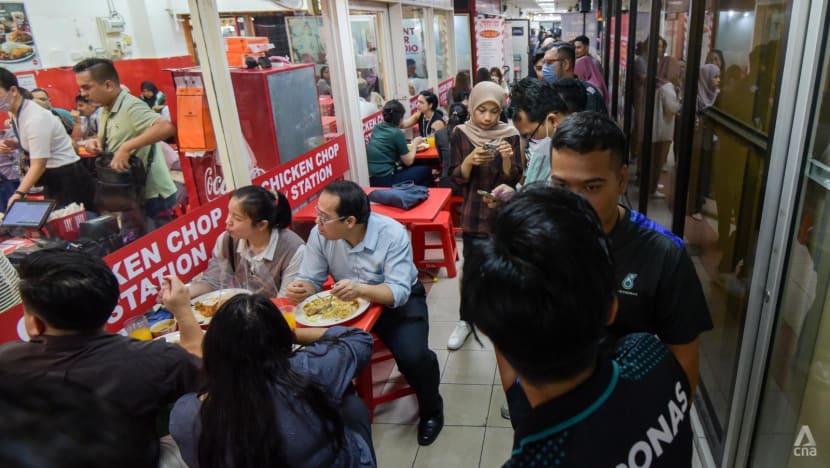Workers sceptical of better pay, firms concerned over higher costs as Malaysia pilots Singapore-styled progressive wage policy
The policy is aimed at improving the wages and working conditions of low-income workers in Malaysia, but employers are worried about increasing costs should government incentives be removed.

The Malaysian government is planning on implementing a voluntary progressive wage policy that is aimed at raising the wages of low-income workers in the country. (Photo: CNA/Fadza Ishak)

This audio is generated by an AI tool.
KUALA LUMPUR: When Mr Ahmad Zulkarnain, 31, graduated with a degree from a local university back in 2018, he believed that it would be a stepping stone to a better life.
But for the past few years, he has been stuck earning a monthly salary of RM3,500 (US$750) working for a small engineering firm in the Klang Valley.
As a single man, Mr Ahmad said that he can scrape by but is left with a few hundred ringgit each month after paying off his rent, car instalment payments as well as student loans and daily necessities.
He noted that things have become tougher at a time when the prices of goods have skyrocketed due to inflation.
“I have asked my employers for a raise, but they have been telling me to wait for quite a while now. I have been on the lookout for other jobs as well but have difficulty in finding something that can pay me more,” said Mr Ahmad, who hails from the state of Perak.
When Malaysia’s Economy Minister Rafizi Ramli announced on Nov 30 that the government was in the process of implementing a progressive wage policy, Mr Ahmad’s interest was piqued as he believed that it was a good initiative that may potentially increase his monthly pay.
Designed to be voluntary, incentive-based, and productivity-linked, the policy is aimed at improving the wages and working conditions of low-income workers in Malaysia.
It takes inspiration from Singapore’s Progressive Wage Model implemented and identified in specified sectors, where a multi-year salary increment schedule is set out for workers in tandem with skills acquisition on their part.
Only Malaysian employees who earn less than RM5,000 a month will be eligible for the programme, with workers from multinational and government-linked companies exempted from participating in the project.
When tabling a white paper on the policy in parliament, Mr Rafizi said that the voluntary programme will target 1,000 firms for the pilot project that is expected to begin next June, with a focus on micro, small and medium enterprises.
He added that according to official data, wages grew at an average of 4.1 per cent from 2011 to 2022, with low wages having a serious impact on the lives of workers.
While Mr Ahmad looks forward to any policy that may boost his wages even by a few hundred ringgit, there is scepticism among other stakeholders on the implementation of the policy.
Employers have expressed concerns about its potential impact on their businesses and its viability in the long term while workers’ groups are worried that the policy will turn out to be another wage subsidy scheme.
Separately, an economist told CNA that the policy needed to be in place for several years beyond the initial one-year trial to induce behavioural changes in employers but believed that it is a step in the right direction to raise the wages of low-income workers in the country.
“It is a win-win model for both employers and employees. For the employees, it is a commitment for self-development and self-initiative while getting a rise in wages. For employers, the higher productivity of employees will offset the cost of higher wages,” said Mr Lee Heng Guie, an economist and executive director of the Socio-Economic Research Centre (SERC).

CONCERNS FROM EMPLOYERS
Dr Syed Hussain Syed Husman, the president of the Malaysian Employers Federation (MEF) said the idea of the pilot project was the right one, as stakeholders could learn and then make improvements upon it.
He, however, pointed out that they may not be interested in the scheme as the Malaysian government only announced that the incentive given to firms would last for the first 12 months and any further subsidies would be dependent on the country’s financial resources.
“This may hinder some employers from participating. Once granted, salary increases will be permanent and cannot be taken away and employers need to ensure that high salary increases will be sustainable in the long term,” he told CNA.
According to Mr Rafizi, participating companies will be eligible to receive cash incentives of up to RM200 monthly for 12 months for fresh graduates and entry-level posts, while for non-entry-level posts, the incentive rate is proposed to be up to RM300 monthly for 12 months.
The increments for the employees will be in line with the increase in employee productivity, Mr Rafizi claimed.
The granting of these incentives will be reviewed every year based on the government's fiscal position, he added.
Mr Lee - the economist - echoed Dr Syed’s sentiments and said that the government must provide subsidies for at least three years before behavioural changes could be instituted among employers.
“If it’s one year, I doubt it will institute behavioural changes and we will (not) see any benefit from the model,” he said, adding that the policy could help uplift wages of the lower-skilled workers.
According to the white paper, about two-thirds of the Malaysian workforce or four million people earn less than RM5,000 a month.
Mr Lee, however, cautioned that the government needed to come in from the start to provide transitional support to kickstart the scheme but that the incentives needed to be weaned off eventually.
“You don’t want to create a situation where there is overdependence on the subsidies and things will go back to normal if they are removed,” he said.
IMMEDIATE CONCERNS COME FIRST FOR BUSINESSES
Mr Chin Chee Siong, the secretary-general of the Small and Medium Enterprises (SME) Association of Malaysia said that while he supported the policy, he was uncertain about its viability.
“The sentiment among many SME employers, based on my conversations with them, is reluctance to implement it,” he told CNA, adding that they did not have full details of the programme for now.
He said that the firms’ concerns primarily revolve around apprehension regarding their business performance and the priority given to enhancing their operations to navigate challenges like the implementation of e-invoicing and consumer spending constraints.
“Despite the potential benefits of the policy, SMEs appear focused on addressing immediate business concerns before committing to its implementation,” he said.
Mr Chin added that the potential financial implications may arise from a seemingly intricate process, particularly involving the procedures for claiming back the higher wages paid.
“If the amount is substantial, it could adversely affect cash flow (for the firms), especially when wages are paid in advance, with incentives only being reclaimed later.
“Given that many SMEs are grappling with challenging business conditions in the initial 10 months of 2023, an additional burden like this is likely to discourage them further,” said Mr Chin.
He anticipated that many SMEs may not be prepared to participate in this program initially and that most were likely to observe the outcomes of the pilot run before engaging in the initiative.
Dr Syed of MEF said that the pilot project would be introduced next year at a time when the country is facing an uncertain global economic challenge.
The International Monetary Fund (IMF) projects the prospect of world economic growth to grow slower from a baseline forecast of 3.5 per cent in 2022 to 3 per cent in 2023 and 2.9 per cent in 2024.
Dr Syed added there was no mention of any assistance to be given to employers to train and retrain workers to make them more productive and proposed that the government should bear the cost for firms participating in the programme.
Mr Rafizi had earlier said that companies participating in the programme must send their workers for training and upskilling programmes that are recognised by the government.
“The government needs to intensify discussions and raise awareness of the policy to all stakeholders so that more employers will participate in the programme,” said Dr Syed.
Mr Lee believed that the cost of training and upskilling the workers would be offset by the Human Resources Development Fund (HRDF) that employers are already contributing to.
The HRDF is a mandatory levy that all employers must contribute to, with financial aid then provided to employees who perform training in relation to their job scope.
Mr James Anthonysamy, the general manager of Chocofac Malaysia - a company that manufactures chocolates in Bangi, Selangor - said that the company is interested in applying for the pilot programme.
The firm has a headcount of about 40 people, half of whom are foreigners mainly in the production side of the business. He said that in the quality control department, they have several Malaysian employees who would qualify for the programme.
“We understand the concern about the cost of living and how it affects our employees, so any government help in trying to boost wages will be welcome,” he said.
When asked about how productivity would be measured, Mr James said they would have to set some benchmarks for the employees although it was still to do so because of the lack of details on the pilot programme.
“The government must speak and engage the industries,” he said.
Many other business owners that CNA contacted were not aware of the policy and said they would be taking a wait-and-see approach to what the programme entails.
UNIONS ASK FOR INCLUSION IN TALKS
Meanwhile, there seems to be apprehension from the side of the workers’ unions as well, with the secretary-general of the Malaysian Trade Union Congress (MTUC) Kamarul Bahrin Mansor saying that they were not invited for talks about the policy.
“Any new policy concerning workers that the government wants to implement should be discussed with workers and their representatives,” he told CNA.
Mr Kamarul said that MTUC had yet to discuss the white paper internally and could not comment much on the policy for now.
He, however, had some questions about how productivity would be measured in certain sectors.
“It could work for someone who works in a factory but how about for a cleaner or a security guard? There are many questions about its implementation and how it will work,” said Mr Kamarul.
Giving an example of those who work as cleaners, Mr Lee proposed that employers could invest in these workers by ensuring they grow in their careers to reach a supervisory level
Mr J. Solomon, the secretary-general of the Bank Union Employee of Malaysia (NUBE) cautioned that the policy will turn out to be another wage subsidy and claims that its link to productivity is “false”.
“Malaysia’s wage structure was never tied to productivity. In fact, over the past decades, workers’ productivity in the manufacturing and services sectors has detached from wage growth. Productivity grows higher than wage growth,” he told CNA.
Malaysia currently has a minimum monthly wage of RM1,500 per month, which was implemented in May of last year. Under the National Wages Consultative Council Act 2011, the minimum wage must be reviewed every two years.
Mr Solomon claimed that the current minimum wage level is unfair and that the actual minimum wage implemented last year should have been around RM2,300 per month, citing the minimum amount needed to not live in poverty as well as the increased cost of living.
“We seem to be so eager to talk about ‘low’ workers' productivity and not serious about providing fair wages for the workers. The white paper is also more concerned with solving employers’ ‘claim’ of workers having low productivity,” he said.
Parti Sosialis Malaysia (PSM) deputy chairperson S. Arutchelvan said that he was worried that the progressive wage policy would come at the expense of the minimum wage policy which he stressed was something that workers fought very hard for.
“The progressive wage policy, if implemented, should be anything above a National Minimum Wage reviewed every two years. Don’t replace the minimum wage policy, just enhance it,” he said in a statement on Dec 1.
Mr Rafizi said in a post on X on Dec 4 that the minimum wage would stay, and that it would be strengthened by the progressive wage policy.
Mr Chin of the SME Association believed that the two were not related as the minimum wage was law while the progressive wage policy is just a pilot programme for now that is not mandatory.
He believed that the government has a big role to play in ensuring that wages are high by bringing in more development and foreign direct investment (FDI) into the country while maintaining the ease of doing business in the country.
Mr Chin also hoped the government would help businesses overcome issues they face such as the lack of good workers.
“If I am doing well, I won’t mind paying my staff (members) more,” he said.
Mr James - the general manager of the chocolate firm - separately hoped that the government would bear the cost of training their employees and said that they welcomed the financial assistance pledged by the government.
“If there are no subsidies, the prices of products will go up. When the minimum wage was increased last year from RM1,200 to RM1,500, we had no choice but to raise the price of our products,” he said.
As for Mr Ahmad, he can only hope that his employer participates in the programme but does not really expect them to do so.
“If the policy only results in extra expenditure for the company, they will not participate in the programme. It is time that I look harder for another job,” he said.





















